FOR IMMEDIATE RELEASE
(中文见下)
Committee of 100 Mourns Passing of Founder I.M. Pei
(New York, NY, May 16, 2019) – The Committee of 100, a non-profit leadership organization, mourns the passing of founder I.M. Pei at age 102. The acclaimed architect, famed for iconic projects such as the Louvre Pyramid in Paris and the East Wing of the National Gallery of Art in Washington, D.C., the Bank of China in Hong Kong, the Rock & Roll Hall of Fame, and dozens of high-profile projects, passed away in New York City yesterday. Pei was born in Guangzhou, China in 1917. After coming to the United States on the S.S. President Coolidge, via Angel Island off of San Francisco, he graduated from MIT and Harvard University, schools which he selected because of their commitment to modernism. He felt people in his new home received him warmly, wanting to know more about him, and, through him, China. During World War II, he joined the National Defense Research Committee, which supported the United States in the conflict.
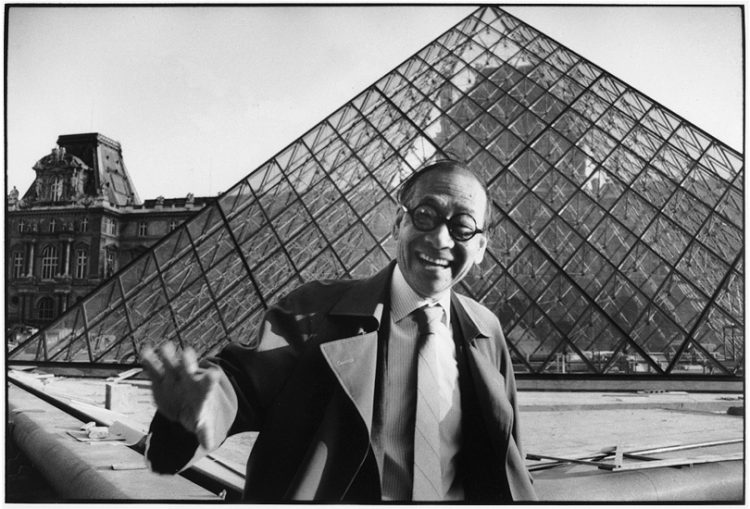
After the war, he quickly established himself as a leading designer in New York City. Among the early commissions that most touched him was the selection in 1964 by Jacqueline Kennedy for the presidential library dedicated to John F. Kennedy, in Boston, Massachusetts. The building, truncated to symbolize the death of the slain leader, was regarded as a landmark upon completion. His later projects included the Fragrant Hill Hotel in Beijing; the Miho Museum near Kyoto, Japan; the Suzhou Museum in Suzhou, China; and the Museum of Islamic Art in Doha, Qatar. He won the Pritzker Prize, the highest honor in the field, in 1983. He returned to China only in 1974, but continued to work there after then with multiple major commissions. His sons, Chien Chung Pei (“Didi”) and Li Chung Pei (“Sandi”), continue practicing as Pei Partnership Architects in New York City.
H. Roger Wang, Chair of the Committee of 100 (“C100”), said, “What a wonderful life and great achievements. I.M. exemplified to the utmost what it means to be Chinese American. Our deepest condolences to the Pei family.”
Beyond his buildings, Pei envisioned another institution. He created C100. At the suggestion of his long-time friend, Nobel Laureate Dr. Henry Kissinger, Pei called together Chinese Americans thirty years ago. At a black-tie dinner party in Manhattan in the mid-1980s, Kissinger had proposed to Pei that Chinese Americans could play a unique role. The combination of Chinese cultural background and US citizenship would make them invaluable in bridge building between the two nations. Individuals who had achieved so much also could advocate for the community as was true of other ethnic groups. Pei had always been proud of his Chinese ancestry. He also was committed to his American lineage. In a tribute video for his 100th birthday, he observed, “My children, my grandchildren particularly, they are becoming more and more American. . . They should become American, they are. But somehow, I also want them to know that they came from somewhere, that has a long history behind it. . . I came as a Chinese, I remain as a Chinese. Now I am American Chinese.”
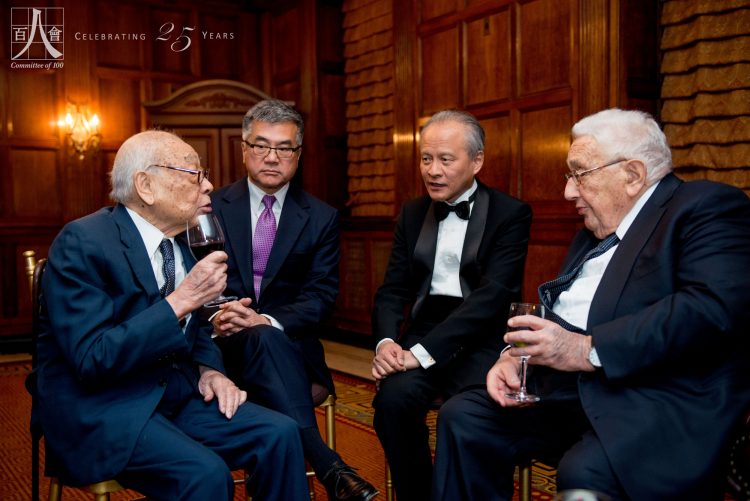
As the most famous Chinese American, Pei was able to invite cellist Yo-Yo Ma and four others — financier Henry Tang, philanthropist Oscar Tang, physicist Chien-Shiung Wu, and businesswoman Shirley Young — to join him in the formation of an organization that has since become established on both sides of the Pacific Ocean. Only Pei could have convened such prominent persons. C100 has remained true to Pei’s ideal by blending a deep understanding of China with the inspirational principles of America. Its members have been called upon for expert advice and counsel.
As Henry Tang recalled, “I was seated between I.M. and Henry Kissinger and the discussion turned to the lack of participation in public affairs by Asians and Chinese in the US. Kissinger then leans over and says ‘you must do this for your people’, meaning the formation of a public institutional body to engage in the dialogue of relations between greater China and the US. Hence, three years later, in 1989, when US-China relations were at a challenging point, I.M. agreed to heed the former Secretary of State’s advice and form the Committee of 100. Over the next thirty-plus years, I.M. was active in numerous behind-the-scenes meetings between Washington, Beijing, Hong Kong, and Taipei. I.M.’s interest in diplomacy and global peace was a passion not well known to those outside his family and closest friends. A personal friend of presidents, prime ministers, royalty, his quiet diplomatic elegant advice was quietly sought and respected.”
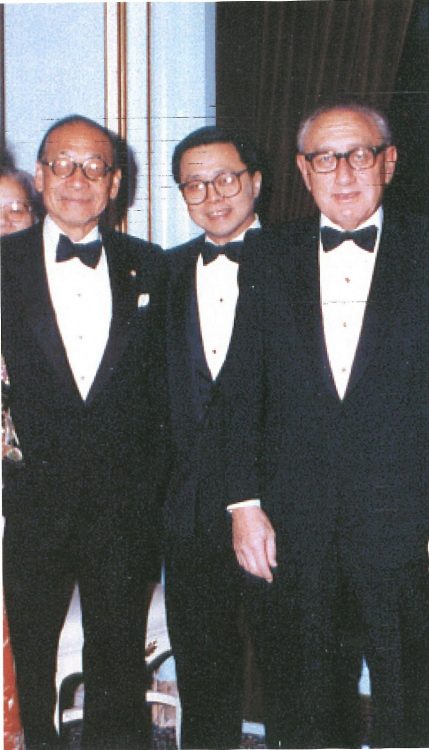
Only recently, Pei gathered with C100 co-founders to celebrate its success. A photo of the occasion, with his son Didi, also a member of C100, appears below.
C100 members have been effusive in honoring an individual who made his mark in the world selflessly and always dedicated to the greater good. The tributes have come in from around the world.
Former C100 Chair John Chen, the CEO of Blackberry, said, “He was the greatest role model for all Chinese Americans. We and generations beyond are all in debt to his leadership, kindness, and skills.”
Shirley Young shared, “I.M. and I have been connected as friends across three generations – his parents Uncle Pei and Aunt Aileen, who I often saw with my mother and stepfather Wellington Koo, with his wife Eileen and his sons, Didi and Sandi, and daughter, Liane. He loved my mother’s red cooked pork at our home dinners which he enjoyed as a forbidden indulgence. I remember well the day in 1989 when several of us were invited to his office to discuss the need for Chinese in America to have a voice. This planted the seed which soon grew to be the Committee of 100. When he completed the Suzhou Museum in 2010, he asked me to create a performance for the private opening celebration in the museum garden – an evening of music and dance under the mid autumn moonlight accompanied by his favorite bamboo flute and ending in fireworks by Cai Guoqiang. Our last meeting on April 22 this year was with the co-founders of the Committee of 100. I brought his favorite Shanghai salt cabbage and pork egg rolls which he happily consumed.”
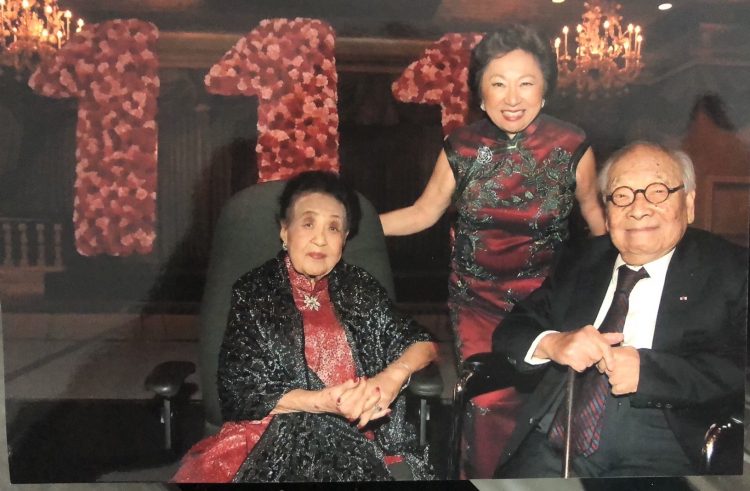
C100 President Frank H. Wu said, “It is humbling to meet an individual such as I.M. Pei. He broke through barriers; he changed the world around him, not only materially but also idealistically. C100 exists because he gave back.”
The members of the Committee of 100 salute I.M. Pei. He will be remembered through his creations: magnificent structures as the world had never seen before and an organization dedicated to helping humanity.
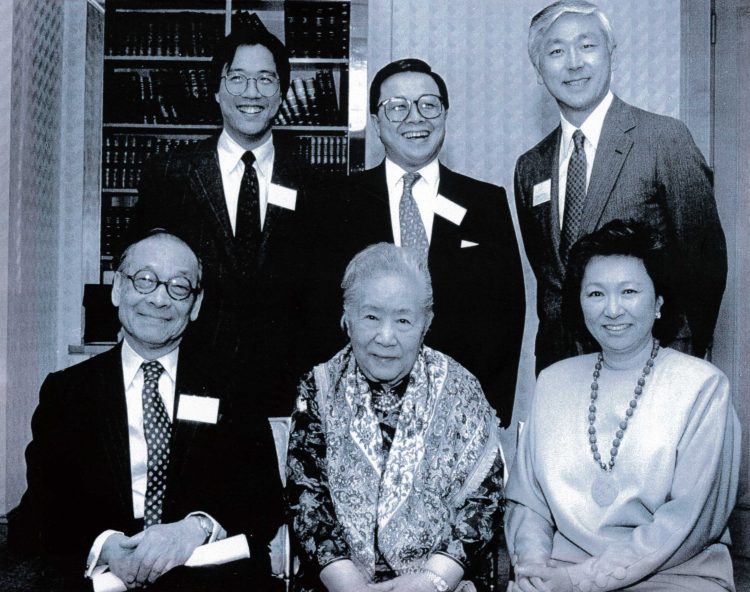
The Committee of 100 is a national, non-partisan leadership organization of prominent Chinese Americans in business, government, academia, and the arts. For 30 years, the Committee has been committed to a dual mission of promoting the full participation of Chinese Americans in all fields of American life, and encouraging constructive relations between the peoples of the United States and Greater China. www.committee100.org
(美国纽约州纽约市,2019年5月16日) – 美籍华裔领袖组织百人会沉重悼念创始人贝聿铭。著名建筑大师贝聿铭于昨日在纽约逝世,享年102岁。他的代表作包括法国巴黎卢浮宫金字塔、华盛顿国家美术馆东馆、香港中银大厦、克利夫兰市摇滚名人堂等。贝聿铭于1917年出生于中国广州, 17岁时登上远赴美国的库利奇总统号, 后求学于麻省理工学院与哈佛大学建筑研究所。
二战结束后,他很快成为了纽约最杰出的建筑设计师之一。在早年的建筑项目中,最让他为之动容的是杰奎琳·肯尼迪在1964年任命他在波士顿建造的肯尼迪总统图书馆。这座纪念肯尼迪遇刺的图书馆,一经落成便在美国建筑界引起轰动,成为地标性建筑。他其后的代表作包括北京的香山饭店、京都的美秀博物馆、苏州博物馆、多哈的伊斯兰艺术博物馆等。贝聿铭在1983年获得了建筑界最高荣誉普利兹克建筑奖。
百人会理事会主席王恒表示:“多么美好的一生和伟大的成就!贝聿铭先生塑造了一个完美的美籍华裔的典范。我们向贝氏家属表示最深切的哀悼。”
除了在建筑上的卓越成就外,贝聿铭将他的远见带入了另一家机构。他创立了百人会。三十年前,在他的老朋友、诺贝尔奖获得者亨利·基辛格博士的建议下,他召集了一批华裔美国人,发起成立了美籍华人领袖组织百人会。在20世纪80年代中期于曼哈顿举行的一个晚宴上,基辛格向贝聿铭提出,华裔美国人可以发挥独特的作用。中华文化背景和美国公民身份的结合将使他们在两国之间的桥梁建设事业中拥有无可估量的价值。具有如此杰出成就的个体们也应该像其他族群一样,为整个群体争取权益。贝聿铭一向以他的中国血统而自豪,同时也不忘美国精神的传承。在他100岁生日的致敬视频中,他说,“我的孩子们,特别是我的孙子们,他们变得越来越美国了…… 他们应该成为美国人,他们是美国人。但是,我总希望他们知道他们来自一个有个悠久的历史的地方……我来时是个华人,一直都是华人。现在我是美籍华人。”
作为最著名的华裔美国人,贝聿铭邀请大提琴家马友友、金融家邓兆祥、慈善家唐骝千、物理家吴健雄以及女企业家杨雪兰,一起创办了这家自从成立后就在太平洋两岸影响深远的组织:百人会。只有贝聿铭能够在当时把这么多名人召集在一起。百人会一直秉承着贝聿铭的初衷,致力于将对中国的深刻理解与美国鼓舞人心的价值观结合起来。百人会的成员被公众认为是中美交流的诚实媒介和意见领袖。
据邓兆祥回忆,“我当时坐在贝聿铭和亨利·基辛格中间,讨论到关于亚裔和中国人在美国社会缺乏公众参与的问题。基辛格侧身过来说’你必须为你的人民做这件事。’”
就在近日,贝聿铭与其他百人会联合创始人一起共同庆祝百人会的成就。
百人会会员纷纷致辞悼念,并向这位给世界留下了伟大遗产、一生致力于造福社会的大师致敬。
百人会前理事会主席、黑莓公司首席执行官程守宗说:“他是所有华裔美国人最伟大的榜样。我们世世代代都受惠于他的领导力、仁慈心以及高超技艺。”
杨雪兰分享到:“贝聿铭与我是三代世交——他的父母,贝叔叔与艾琳阿姨,他的妻子儿女,和我的母亲与继父顾维钧常常相聚。他很喜欢吃我母亲在家做的红烧肉,会不顾形象地大快朵颐。我们最后一次相见是今年的4月22日在百人会联合创始人的聚会上。我带了他最喜欢的上海腌白菜和猪肉蛋卷,他吃得心满意足。”
百人会会长吴华扬说:“贝聿铭这样的杰出人物让我觉得高山仰止。他冲破种种屏障;他改变了他周围的世界,不止是物质上的,更是意识精神上的。百人会因贝聿铭的贡献而存在。”
百人会的会员对贝聿铭先生致以最崇高的敬意。他将因他创造的前所未有的宏伟建筑,和充满人文关怀的组织而被永远铭记。
百人会是由杰出美籍华人组成的非营利组织,成员来自商界、政界、学术界及各艺术领域,由蜚声全球的建筑大师贝聿铭和大提琴演奏家马友友等人发起成立。成立近30年来,百人会汇集其杰出会员的力量,致力于其双重使命,即推动美籍华人在美国社会生活中的全面参与及促进美国及大中华地区间建设性关系的发展。关于百人会更多信息:www.committee100.org.